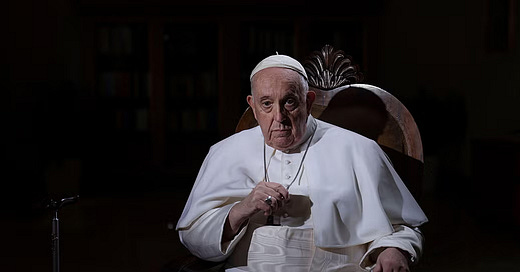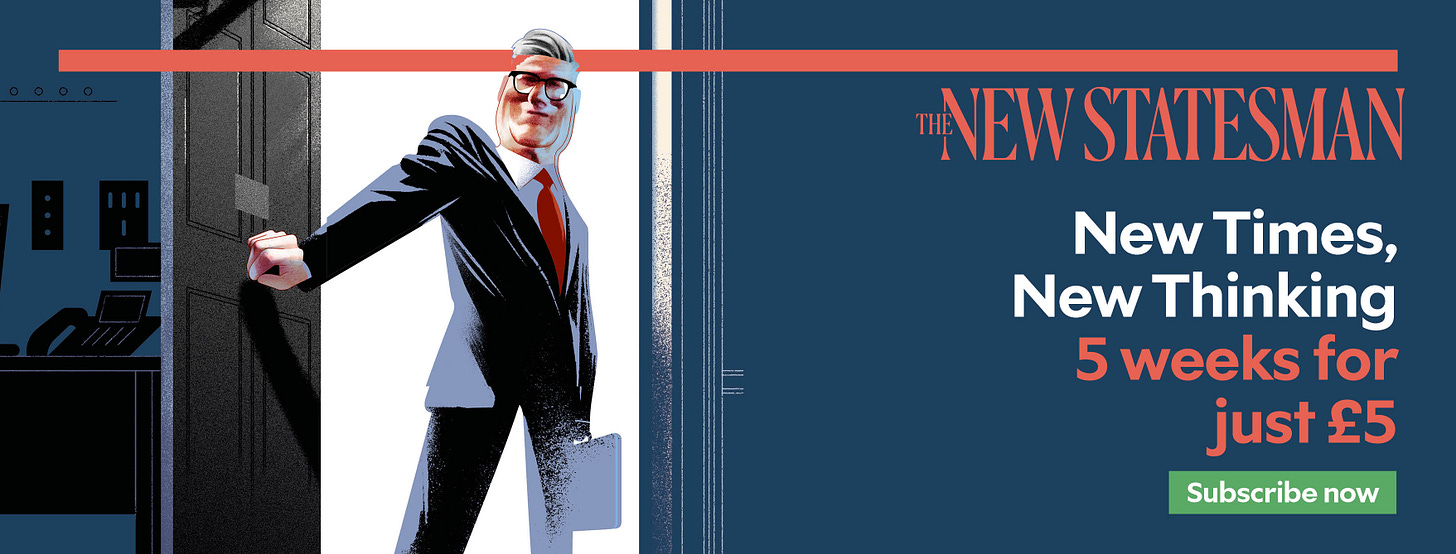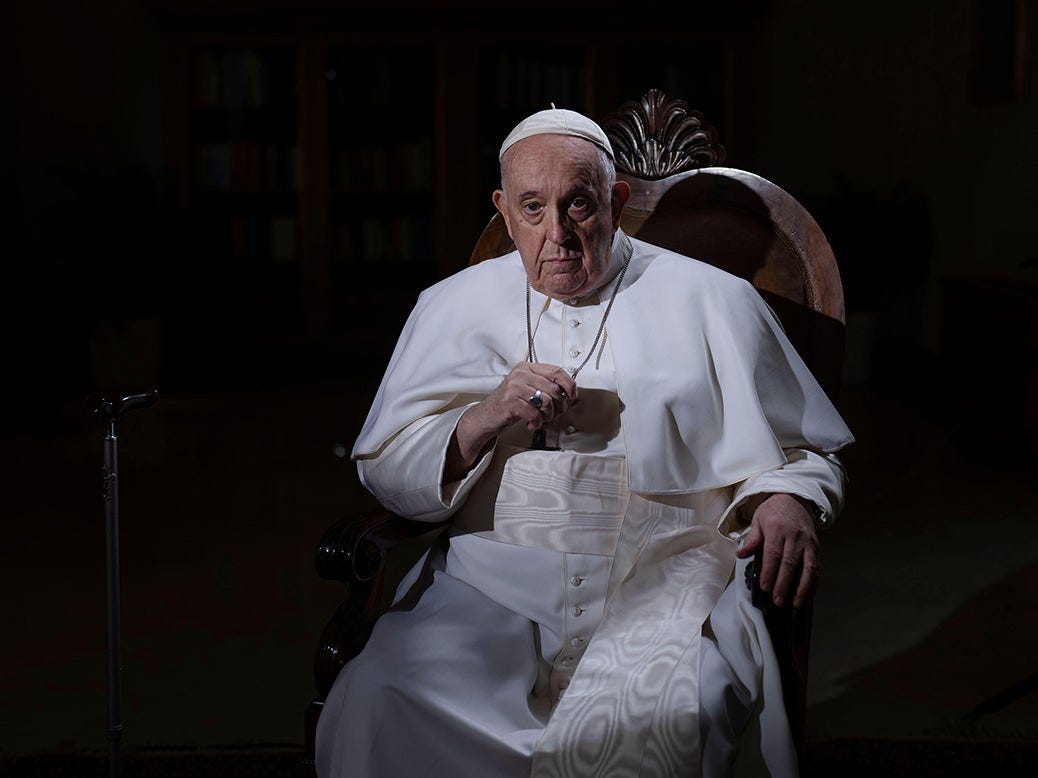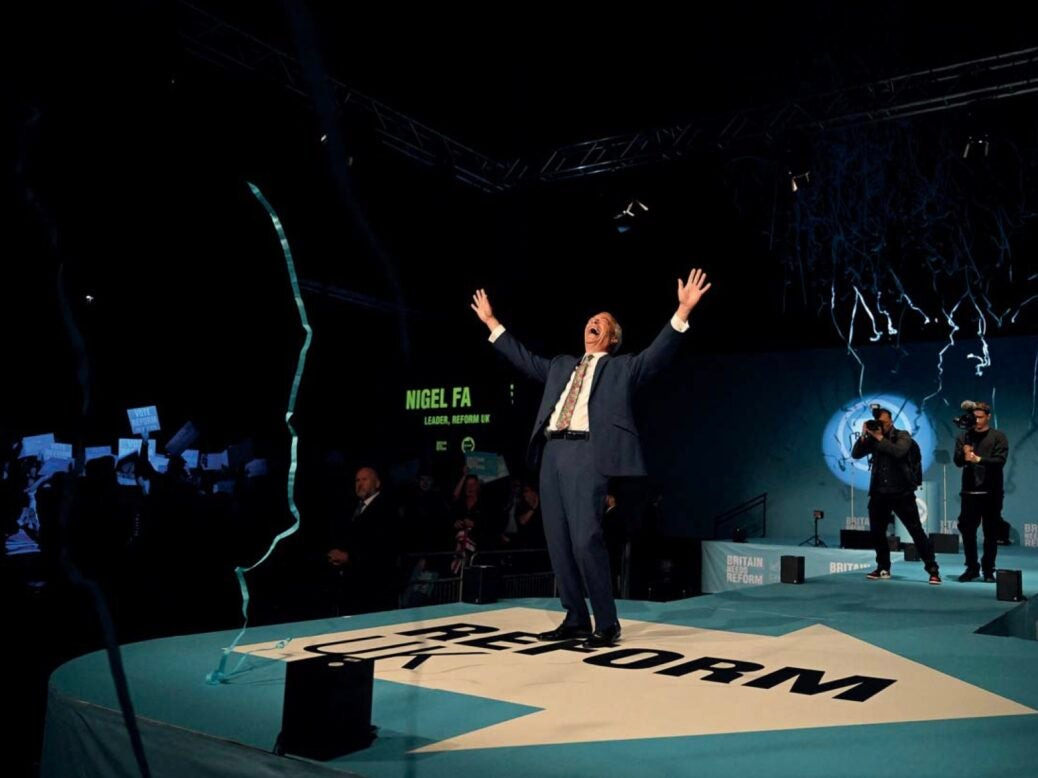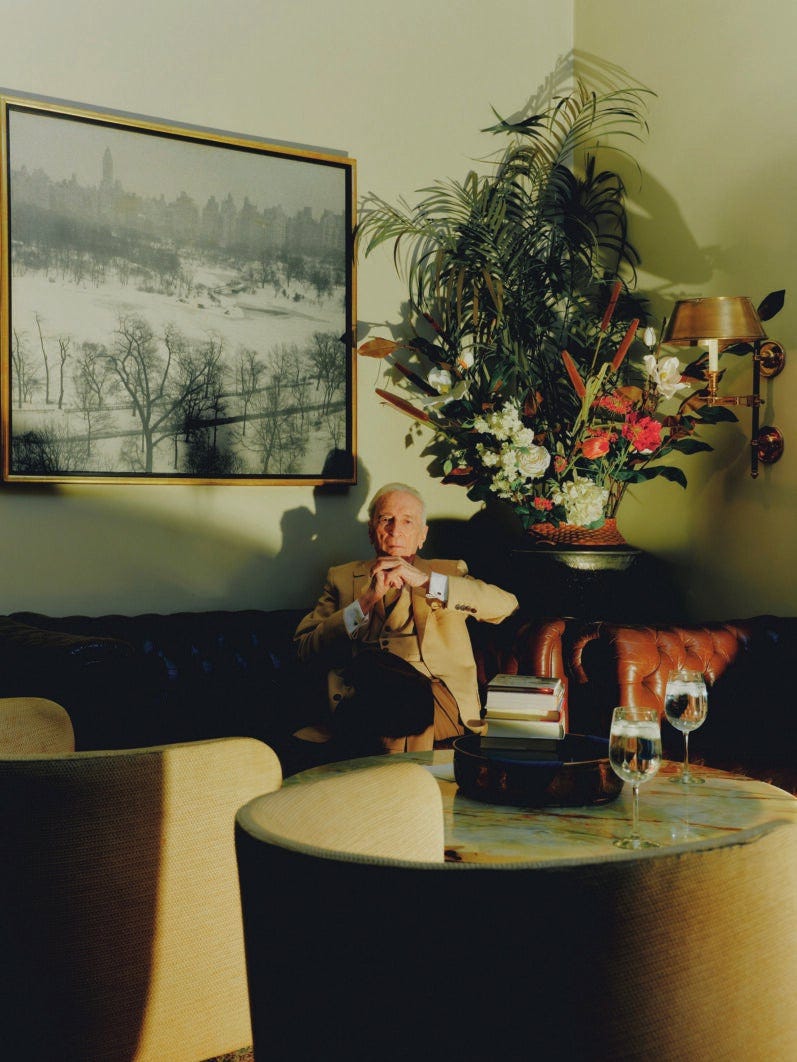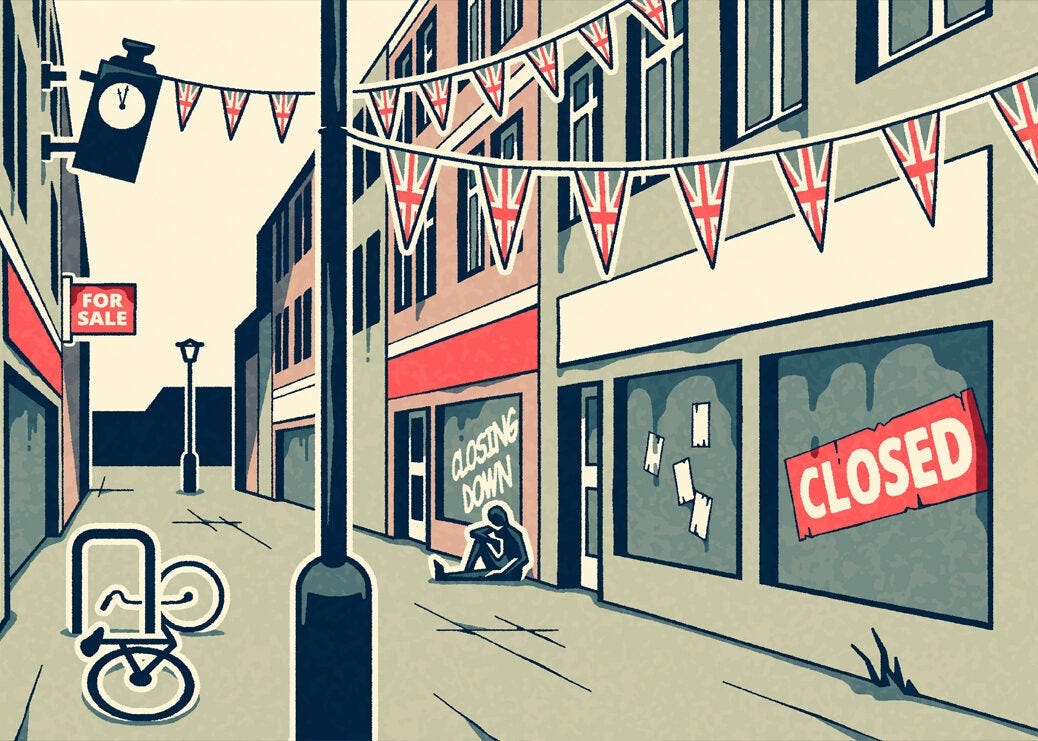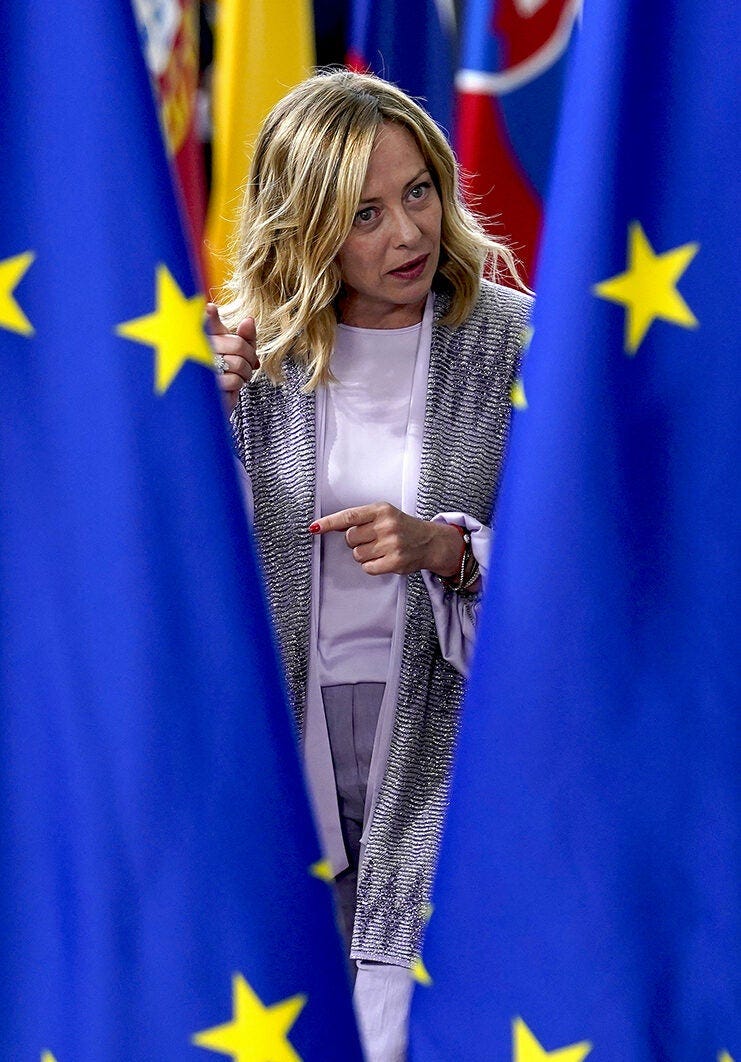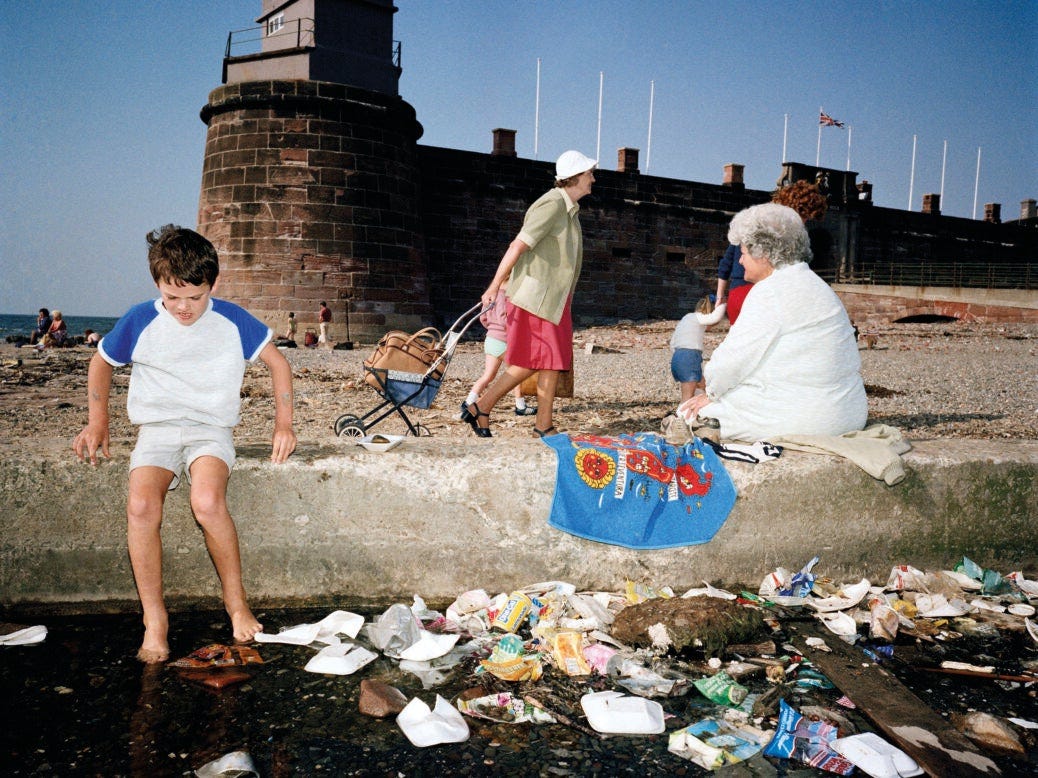The Saturday Read: Illusions
Inside: Pope Francis, China’s plan for victory, Reform’s biggest week yet, Gay Talese, Joan Didion and England’s white working class.
Good morning. Welcome to the Saturday Read, the best of the New Statesman, in print and online this week. This is Finn with Nicholas and George.
As you are receiving this email, Pope Francis’s funeral is just getting under way. Rome is thronged with mourners – 200,000 are expected to attend – alongside every foreign dignitary you can rattle off the top of your head.
Papal funerals are spectacles, but Francis last year made arrangements to tone the whole thing down – to be “laid out and buried like any son or daughter of the church”. It is in keeping with his aesthetic humility: while alive he swapped out the ermine cloak for a simple cassock, replacing a throne with a wooden chair. I wrote about Francis as a Jesuit and the future of the Church under his successor.
When it comes to Francis there is a tendency, I think, to over-index the politics of it all. True, Francis is a metaphor for the battle tugging at the soul of St Peter’s right now. (Ought the Church modernise along with the rest of the world or stick to its founding doctrines?)
But the Catholic Church is not a political government, it is an organ of faith. Francis had “politics”, of course – a Jesuitical commitment to the poor, a staunch pacifism (calling for a ceasefire in Ukraine, for example), a relative liberalism on non-believers and homosexuality, a reputation for punishing conservatives in the curia. But it was faith not politics that was the central stimulus for his thought and action. When the world considers his legacy today, it should not lose sight of that.
As ever, thanks for reading and have a great weekend.
1—“Losing our illusions”
And here is Madoc Cairns’ glittering obituary. Maybe Francis’s efforts to modernise the Church and extend its hand out to the poor were futile. But in the end, perhaps “God speaks through our defeats” most of all. FMcR
If Francis was defeated in his efforts to shape the world, defeated in his attempts even to direct his Church, it was because popes can preach, appeal, convict – but not compel. The power of the papacy is, in this sense, like the light of the moon: a beautiful illusion. St Peter’s throne is also his prison cell.
2—“China will win”
We have been living in the world created by America’s victory in the Cold War. Now, Andrew Marr cautiously writes, we must prepare for something more menacing: Chinese victory in the present superpower confrontation. NH
At some point in the next few years, either Beijing or Washington will emerge technologically and politically dominant over the other, armed with the most powerful technology mankind has yet created. Which side will triumph? To me, the answer seems obvious… We can hope that old, deep America, so generous, so cultured and so wise, wakes up and finds herself again. But we cannot bet on that. We must, instead, begin the intellectual and practical work of bracing for the Chinese century.
3—“The Nigel dog-and-pony show”
Once seen as a parasite of the Conservative vote, today Reform is an equal threat to Labour. Next week’s local elections will be its first great test. Speaking to party insiders, Rachel Cunliffe asks if it’s one the party can pass. NH
Earlier in April, at a mega-rally in Birmingham, Farage had arrived on stage riding a JCB digger, which he said had been lent to him by the company’s chairman, Lord Bamford. That’s the same Lord Bamford who hosted the wedding of Boris Johnson at his Gloucestershire estate in 2022 and was until very recently a “super donor” of the Conservative Party. “If I were the Tory treasurer, I’d be shitting myself,” Gawain Towler, former head of press for Reform, told me.
4—“‘Dress up for it’”
Harry Lambert – this newsletter’s founder – meets Gay Talese in his Manhattan brownstone. It is nice to read about people who care so deeply about their craft. Talese was, as Harry puts it so well, the first journalist he had encountered [back in 2008] “who spoke of their work like it was art”. FMcR
If his politics no longer accord with his milieu, his tastes still do. He “reads the ‘New Yorker’ with admiration every week” and respects David Remnick, its indefatigable editor. “You write him an email, you get a reply. A lot of people at the ‘New Yorker’ don’t have good manners,” he said, remembering staff he took out to dinner who never wrote back. “I never let a letter or email go by without an answer.”
I can attest to that. I first emailed Talese hoping to meet him in 2015. (He replied, offering dates and providing his address.) Reading his 2008 ‘Paris Review’ interview one night at university had made me want to be a magazine writer.
5—“A very British opiate”
The idea of our nation minted under the term “yookay” has reached a savagely high boil on social media. It envisions the UK as a grim, lawless state, where standing patiently in a queue is just an invitation for a balaclava on a passing e-bike to swipe your phone. Nick takes the measure of things. GM
Rucksacked Deliveroo cyclists in convoy, swarming along road and pavement. Tattered, pockmarked high streets, enlivened only by phone shops, chicken shops and random outbursts of violence. And, most prominently, black and South Asian men, the former threateningly ski-masked and communicating exclusively through drill rap, the latter combining an aggressively masculine form of Islam with inner-city gang culture. Welcome to “the yookay”, the verbal and social corruption of “the UK” that so much of the political right believes it sees in modern Britain.
To enjoy our latest analysis of politics, news and events, in addition to world-class literary and cultural reviews, click here to subscribe to the New Statesman. You’ll enjoy all of the New Statesman’s online content, ad-free podcasts and invitations to NS events.
In the latest issue of Spotlight, “Energy and Climate Change”, we consider the energy and climate policy debate through its impact on consumers, businesses and the nation. Across these pages, the mid-century deadline looms. With expert commentary and analysis from Miatta Fahnbulleh, Adrian Ramsay, Dale Vince and Andrew Bowie.
6—“Alt-West vision”
“The West” is a term thrown around as though it has a stable meaning. It doesn’t, says Hans Kundnani. Giorgia Meloni’s political strength lies in her rare ability to understand and ventriloquise the many versions of the concept. FMcR
Meloni does not just mediate between the EU and the US but also between two different ideas of the West: the Atlanticist vision represented by Von Der Leyen and the civilisational vision represented by Trump. She is far more supportive of Nato than Trump, but more civilisational in her thinking than Von Der Leyen. What it might mean to reconcile the civilisational and strategic ideas of the West, as Meloni seems to be trying to, is not so much ending Nato but repurposing it for a clash of civilisations – that is, a world in which conflict takes place along civilisational lines.
7—“Wishful thinking”
(If, like me, this image made you wince, I am sorry.) Will Dunn writes the cover story this week on Trump’s economic wrecking ball. It probably won’t confer benefits upon him in the way he suspects. But then again, “Liberation Day” might not be the total catastrophe the other side is predicting either. FMcR
In the UK, Trump’s actions have buried for good the Brexiteer fantasy that Global Britain would have a long list of trade deals to sign the moment it left the EU. We have not brought into force a full free-trade agreement with any single country in North America, South America, Europe, Asia or Africa. We continue to negotiate, but deals take years to conclude and our relatively small size on the world stage makes it unimportant to other nations to conclude a deal. Our major trading partners (the EU and US) enjoy favourable terms because we rely on them more than they rely on us.
8—“Heartlands, colonies and enclaves”
A new book discusses not the “English working class”, but the “white working class”. Increasingly, Britain’s white working class recognise their race as their culture. Tanjil Rashid considers the phenomenon, drawing on both cultural history and his own childhood experience. GM
Demographic reversals are eminently feasible. Israel and the US are showing us some of the tactics even today’s Western democracies can use to remove unwanted populations. Most European countries have at some point tailored their territories with ethnic alterations. Am I being melodramatic? Maybe. When, during last summer’s racist uprising in the UK, footage emerged of whites-only checkpoints in Middlesbrough, I recalled watching similar scenes broadcast from Bosnia in the 1990s. I’m not saying this will happen; only that it could.
9—“The sounds of the sentences”
Received wisdom has it that you can’t contrive cool – unless you’re Joan Didion. Her steady conquest bookstagram came as a result of conscientious self-stylisation, to the extent that she is often accused of having more fans than readers. Lola Seaton asks if Joan Didion without her affect is any Joan Didion at all. GM
The beauty and potency of Didion’s prose is indeed partly down to its strong, dramatic cadences. But the drift of her sentences was not always as clear as they sounded, and the relationship between the music and the meaning would later seem more complicated. If in 1976 Didion could enthuse that “all I know about grammar is its infinite power”, by the time of her 2005 memoir ‘The Year of Magical Thinking’, she was sounding a more equivocal note: “I developed a sense that meaning itself was resident in the rhythms of words and sentences and paragraphs, a technique for withholding whatever it was I thought or believed behind an increasingly impenetrable polish.” It’s an appropriately ambiguous, indeed “increasingly impenetrable” sentence. Note the unsatisfying seam – a little “sinkhole”? – between the clauses: to what exactly does “technique” refer?
George’s Best of the Rest
Joshua Craze: Sudan’s world war
Edward Luce: Vance’s audition as Trump heir
Erin Maglaque: Frog free
Malcolm Forbes: Graham Greene’s growing pains. When Greene was green…
Angus Colwell: My Marco Pierre White obsession
Michel Houellebecq: Benoît
Lila Shroff: The Gen Z lifestyle subsidy
Belfast restaurant certified Italian by Italian Chamber of Commerce
And with that…
I write this dispatch from a street corner with a grand history of ideas. I am outside Fitzbillies Bakery on the King’s Parade in Cambridge. I think Bertrand Russell just walked past me. Here, the double helix was discovered! Over there, Isaac Newton measured the speed of sound. Nabokov composed the stanzas of his studenthood. And here (well, down the road) the New Statesman’s Will Dunn interviewed George Monbiot last night, about his new book Invisible Doctrine: The Secret History of Neoliberalism.
Yes, the Cambridge Literary Festival (partnered with the New Statesman) is well underway. You may have missed Will on neoliberalism (and how it came to control your life) but there is plenty more to come this weekend. I am most excited to see Eimear McBride interviewed by our own Tom Gatti; Rob Cowen and Robert Macfarlane in conversation; and Erica Wagner quizzing Sarah Churchwell on The Great Gatsby, a book about which the NS team harbours strong and not necessarily harmonious opinions. You can see what’s on and think about tickets here. Hope to see you there!
The New Statesman is home to the finest writing on politics, culture and ideas. To stay up to date, subscribe using the link above.
— Finn, Nicholas and George.


